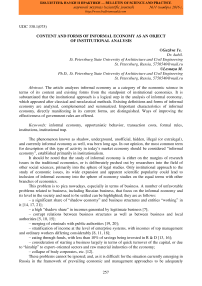Content and forms of informal economy as an object of institutional analysis
Автор: Guzhva Yevgeniya, Lesnaya Maiya
Журнал: Бюллетень науки и практики @bulletennauki
Рубрика: Экономические науки
Статья в выпуске: 11 (12), 2016 года.
Бесплатный доступ
The article analyzes informal economy as a category of the economic science in terms of its content and existing forms from the standpoint of institutional economics. It is substantiated that the institutional approach is a logical step in the analysis of informal economy, which appeared after classical and neoclassical methods. Existing definitions and forms of informal economy are analyzed, complemented and summarized. Important characteristics of informal economy, directly manifesting in its current forms, are distinguished. Ways of improving the effectiveness of government rules are offered.
Informal economy, opportunistic behavior, transaction costs, formal rules, institutions, institutional trap
Короткий адрес: https://sciup.org/14110705
IDR: 14110705 | УДК: 330.1(075) | DOI: 10.5281/zenodo.166902
Список литературы Content and forms of informal economy as an object of institutional analysis
- Беккер Г. С. Экономический взгляд на жизнь//Мировая экономическая мысль. Сквозь призму веков: В 5-ти т. Т.V. В 2-х кн. Всемирное признание: лекции нобелевских лауреатов/отв. ред. Г. Г. Фетисов. Кн. 1. М.: Мысль, 2004.
- Веблен Т. Теория праздного класса. М.: Прогресс, 1984
- Илькевич С. В. Трансакционные издержки и конкурентоспособность экономики России: автореф. дис. … канд. экон. наук. СПб, 2007.
- Дементьева Е. Е. Экономическая преступность и борьба с ней в странах с развитой рыночной экономикой (на материалах США и Германии). М.: ИНИОН РАН, 1992.
- Клейнер В. Г. Коррупция в России, Россия в коррупции: есть ли выход?//Вопросы экономики. 2014. №6. С. 81-96.
- Неформальный сектор в российской экономике: формы существования, роль и масштабы/под ред. Т. М. Долгопятовой. М.: ИСАРП, 1998.
- Свет и цвет в экономике и обществе. Монография/под ред. О. В. Иншакова. Волгоград: Волгогр. науч. изд-во, 2008.
- Сото Э. де. Иной путь. Невидимая революция в третьем мире. М.: Catallaxy,1995.
- Soskice D. Globalisierung und institutionelle Divergenz: Die USA und Deutschland im Vergleich. Geschichte und Gesellschaft, 1999, no. 25, p. 201.
- Уильямсон О. И. Экономические институты капитализма: Фирмы, рынки, «отношенческая контрактация». СПб.: Лениздат; CEV Press, 1996. 702 с.
- Шаралдаева А. Б. Взаимосвязь трансакционных издержек и деловой среды организации//Проблемы современной экономики, 2008. №4. С. 286-288.
- Чернова Е. Г. Слияния и поглощения как основной способ роста крупных корпораций: конспект лекции //Проблемы современной экономики. 2007. №4 (24). С. 477-486.
- Шиганов В. В. Модель управления взаимодействием малых и крупных предприятий в промышленности субъекта Российской федерации. Режим доступа: http://econference.ru/blog/comfo5/156.html.
- Abelshauser W. Business Culture, Markets and Diversified Production Regimes in Historical perspective: USA and Germany in comparison. Available at: http://www.unibielefeld.de/soz/iw/pdf/abelshauser_1.pdf.
- Granovetter M., Swedberg R. (eds.). The Sociological and Economic Approaches to Labor Market Analysis. The Sociology of Economic Life. Westview Press, Boulder, 1992, pp. 233-263.
- Casson M. The Economics of Business Culture: Game theory, transactional costs and economic performance. Clarendon Press, Oxford, 1991, 286 p.
- Putnam R. The Prosperous Community Social Capital and Public Life, American Prospect, 1993, no. 13, pp. 35-42.
- O'Connell, J. Culture shock. The Concise Blackwell Encyclopedia of Management/Ed. by C. L. Cooper, C. Argyris et al. Business & Economics, New-York, 1998, p. 142.
- Drucker P. Management and the World's Work. Harvard Business Review, 1998, no. 5, p. 75.
- Porter M. E. Attitudes, Values, Beliefs, and the Microeconomics of Prosperity. Culture Matters: How Values Shape Human Progress/L. E. Harrison, S. P. Huntington (Eds.). Basic Books, New York, 2000, pp. 14-15.
- Buehn A., Schneider F., 2012. Shadow Economies Around the World: Novel Insights, Accepted Knowledge, and New Estimates, International Tax and Public Finance, 19, 34-45.
- Dreher A., Schneider F. Corruption and the Shadow Economy: An Empirical Analysis, Public Choice, 2009, 144/2, pp. 67-78.


